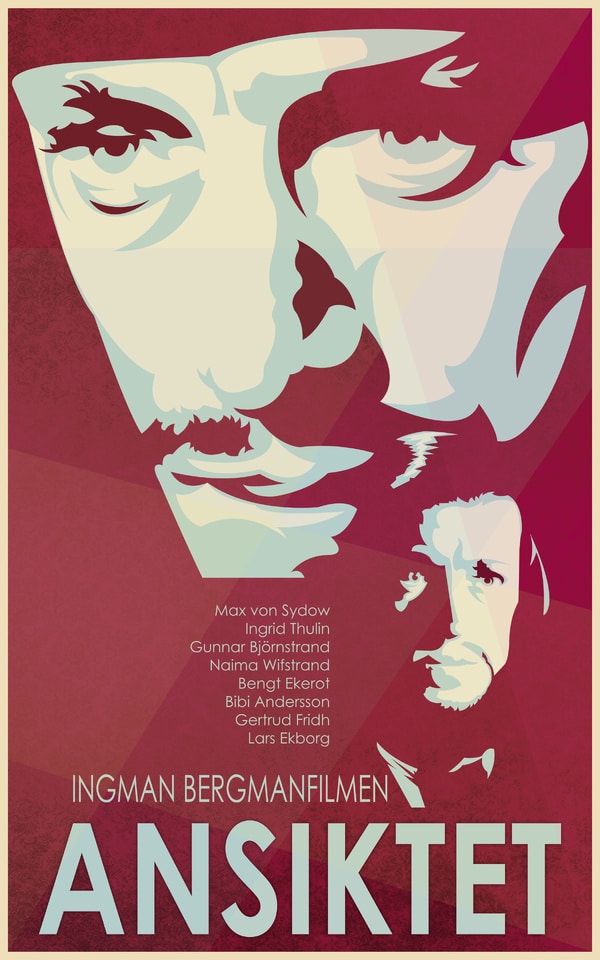One year following the release of The Seventh Seal, Swedish director Ingmar Bergman came out with yet another astounding film entitled Ansiktet, or The Magician. Utilizing a number of actors from the former film (including Max von Sydow, Gunnar Björnstrand, Bengt Ekerot, Bibi Andersson, and Åke Fridell), Bergman produced a story that challenged viewers to question all they held true about science and superstition.
Description taken from The Criterion Collection:
 |
| Not rated. I suggest PG as there is no on-screen violence, gore, or sex...though allusions are made. |
Clocks: Obviously, these objects epitomize time and the passage thereof. The face of a clock is round, symbolizing the fact that time continues on in a cyclical manner. Its hands move steadily, incrementally, and—in the context of this film—they represent everyone's inevitable progress toward death. While time itself is endless when looked at beyond the circumstance of any one individual, it is still a reminder for those who breath and can perceive the notion of a conclusion to their own lives that the mechanisms will eventually, mercilessly wind down.
One character, Ottilia Egerman, continues to grieve the loss of her daughter. She tries to seduce Volger in the hope that he (with his mysterious manner) can somehow alleviate her suffering. When that fails, she turns to her husband. They sit alone in their bedroom, the only sound the ticking of a clock. Its pendulum swings back and forth to mark each and every second as they fall away into the past, bringing its listeners ever closer to an infinite cessation of being.
 |
| "Can you do me a favour? Could you please stop the clock?" —Ottilia Also, look at that exquisite mise-en-scène. UGH. |
Mirrors: Simply put, mirrors are a symbol of reflection...'cause that's what they do: reflect. Physical mirrors are used to capture images of everyday objects, but there exists an idea of the 'spiritual mirror', i.e., a mirror which echoes human consciousness, the results of our actions, and the rewards/punishments "which the consequences of our actions have brought upon us," according to fellow blogger Jodseph Panek.
The Magician takes place during the mid-1800s, so the reflective surface of choice in the rich Consul Egerman's home is glass—very clear, but easy to shatter. After Doctor Vergérus performs an autopsy in the attic, he is assaulted by visions of an unmasked Vogler. He sees the presumably dead man standing just behind him right before the glass within which both of their forms are reflected inexplicably cracks. Spooky. The point here is that Vergérus has wronged a man and is forced to face the fallout, be it guilt, a glimpse into the unknown, or whatever else the universe has in store.
The Magician takes place during the mid-1800s, so the reflective surface of choice in the rich Consul Egerman's home is glass—very clear, but easy to shatter. After Doctor Vergérus performs an autopsy in the attic, he is assaulted by visions of an unmasked Vogler. He sees the presumably dead man standing just behind him right before the glass within which both of their forms are reflected inexplicably cracks. Spooky. The point here is that Vergérus has wronged a man and is forced to face the fallout, be it guilt, a glimpse into the unknown, or whatever else the universe has in store.
 |
| Check out all of those visual metaphors—it was no accident that they were placed together in this shot. |
Shadows: It is difficult not to get all doom-and-gloomy with Bergman's films. He incorporates a lot of philosophy, so motifs such as the truth of reality and the point of existence are bound to pop up all over the place. The Magician—much like The Seventh Seal—covers the human struggle for understanding in a number of ways. This includes, of course, the perception of death. What lies beyond the veil? Well, who really knows?
What I do know is that shadows tend to be symbolic of something dark or evil which, unfortunately, is how many view death. Shadows are also associated with projections, meaning that people project themselves onto others, creating a sort of shadow-self that contains unconscious parts of the original. This is important to the film, as a major scene takes place between Vogler and Johan Spegel in which the latter is thought to have risen from the dead. He views himself as one of God's unused tools; a "convincing" ghost rather than a human with a purpose. Spegel muses, "a shadow of a shadow," then places his hand before Vogler's projection apparatus.
What I do know is that shadows tend to be symbolic of something dark or evil which, unfortunately, is how many view death. Shadows are also associated with projections, meaning that people project themselves onto others, creating a sort of shadow-self that contains unconscious parts of the original. This is important to the film, as a major scene takes place between Vogler and Johan Spegel in which the latter is thought to have risen from the dead. He views himself as one of God's unused tools; a "convincing" ghost rather than a human with a purpose. Spegel muses, "a shadow of a shadow," then places his hand before Vogler's projection apparatus.
 |
| Spegel's shadow puppet reflects his self-image: a slave with cut strings bound for nothing but destruction. |
Hands: It is impossible not to notice the number of times Bergman makes the human hand a point of focus in this film. While hands have many meanings in different cultures around the world, they tend to represent connectivity. Hands can makes signs and gestures that indicate how a person is feeling just as they can be used to put thought into action. They can help and harm, reveal and hide. Remember that Vogler is a magician and, as such, performing sleight of hand is a way of life.
